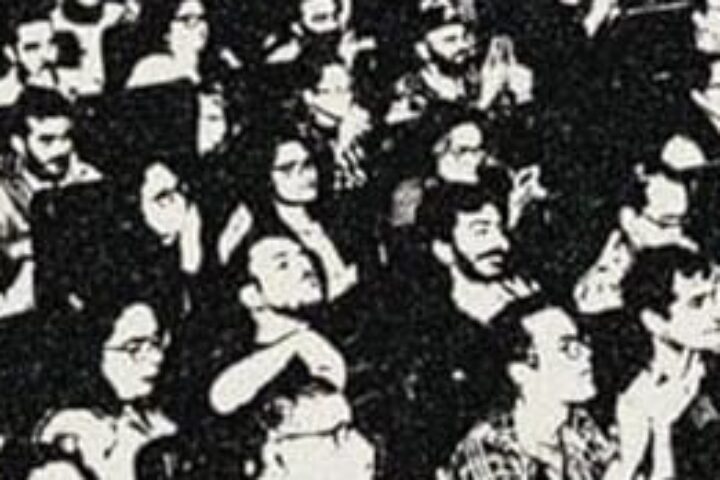Early in the documentary Pictures of Ghosts, writer-director Kleber Mendonça Filho cuts to a television interview with his late mother, Joselice Jucá, a historian and a key figure in the film. The interviewer asks why she’s chosen an oral history as the medium for a project on Brazilian abolitionist leader Joaquim Nabuco. As she explains her process, Mendonça Filho’s voice enters to note that “it may seem like I’m discussing methodology, but I’m talking about love.” The filmmaker seems to have taken his mother’s emotional investment in her subject matter to heart, as the methodology in Pictures of Ghosts—a historical document of his hometown of Recife, with a particular focus on its movie theaters—is ultimately in service of the filmmaker’s own personal relationship to the people, places, and images that he captures.
It’s hardly the first time that Mendonça Filho’s relationship with Recife has taken center stage in his work. His first two fiction features, 2012’s Neighboring Sounds and 2016’s Aquarius, examine Brazil’s neoliberal change and its deleterious effects on the northeastern resort town with a keen eye for changes in local architecture. Clips from Neighboring Sounds figure prominently in the first of the documentary’s three parts, which traces the history of Mendonça Filho’s family apartment in which much of the earlier film was shot.
It’s there that Mendonça Filho introduces his method of excavating history through images, constantly cutting between archival photos and footage, home videos and photographs from his youth, and clips from his early attempts at no-budget filmmaking and his later features. The setting remains the same, but the look of the apartment and the city surrounding it changes as rapidly as the technology of the cameras through which the audience views them.
So much footage of the apartment exists that the filmmaker refers to it as something of a mini-studio, and his affection for the place that fostered his love of cinema is palpable. At one point, Mendonça Filho relates the story of his neighbor’s incessantly barking dog, which was integrated as a plot element of Neighboring Sounds. One day he hears the dog’s barking again, even though the dog has been dead for years. He wonders if this is one of the “ghosts” that populate his films; in reality, the neighbors were screening the film next door, and he had actually heard the barking that he himself had recorded. The documentary is at its most playful in this early section, and Mendonça Filho has a lot of fun matching locations and sightlines from images taken across a span of decades in ways that reveal their not-so-subtle evolution.
At the heart of Mendonça Filho’s argument in Pictures of Ghosts is how much of the resources and capital that allowed for a thriving cinephilic culture in downtown Recife was stripped away in the 1970s and ’80s, and committed instead to making the city into a glamorous tourist destination for wealthy foreigners. One of the first pieces of archival footage we see features Janet Leigh and Tony Curtis on vacation in the city (with little Jamie Lee in tow), a flash of Hollywood glitz that carries uncomfortable associations in context. The film’s second section focuses on a small area in downtown Recife that once housed four movie theaters, a location that Mendonça Filho maps out with geographical precision and vivid nostalgia.
Here and elsewhere, Mendonça Filho’s warm remembrances are streaked with bitterness. He introduces us to his most memorable character, an elderly projectionist named Mr. Alexandre, who worked alongside the filmmaker at the Art Palácio cinema in São Paulo in the ’90s. We see Alexandre, who died in 2002, recalling the demands of censors during Brazil’s military dictatorship on VHS shot by the director. The challenges faced by Brazilian cinema aren’t limited to those imposed by its own government: We learn that these cinemas nearly became part of Joseph Goebbels’s Nazi propaganda project (aided by a sympathetic Brazilian prime minister), and Mendonça Filho likens a building housing offices for all the major American studios to a second U.S. embassy. The links between Brazil’s cinematic history and its broader history of exploitation are rarely spelled out, but they simmer below the surface of the images.
The association also calls to mind Thom Andersen’s sprawling Los Angeles Plays Itself, another work that examines the civic, architectural, and cinematic histories of a city. Pictures of Ghosts doesn’t approach the depth and complexity of Andersen’s masterpiece, more concerned as it is with eulogizing a time and place than Los Angeles Plays Itself’s analytical rigor. While far from a simplistic ode to movie magic, it’s easy to imagine a version of Pictures of Ghosts that digs more deeply into Brazil’s political history and its reflections in the country’s film industry, perhaps one more willing to truly challenge its festival-circuit audience.
Mendonça Filho leans into nostalgia most strongly in the documentary’s final section, which compares the conversion of some of Recife’s cinemas into evangelical churches with the sacred air taken on by the Cinema São Luiz, the city’s one remaining downtown movie house. He comments that “fiction films make the best documentaries,” which sounds like a banal truism until the final scene, an unexpected departure from nonfiction that slyly implicates the filmmaker in his own commentary. As always with Mendonça Filho, to reflect reality isn’t enough, as cinema has to find its own truth, even if it takes some imagination to get there.
Since 2001, we've brought you uncompromising, candid takes on the world of film, music, television, video games, theater, and more. Independently owned and operated publications like Slant have been hit hard in recent years, but we’re committed to keeping our content free and accessible—meaning no paywalls or fees.
If you like what we do, please consider subscribing to our Patreon or making a donation.




